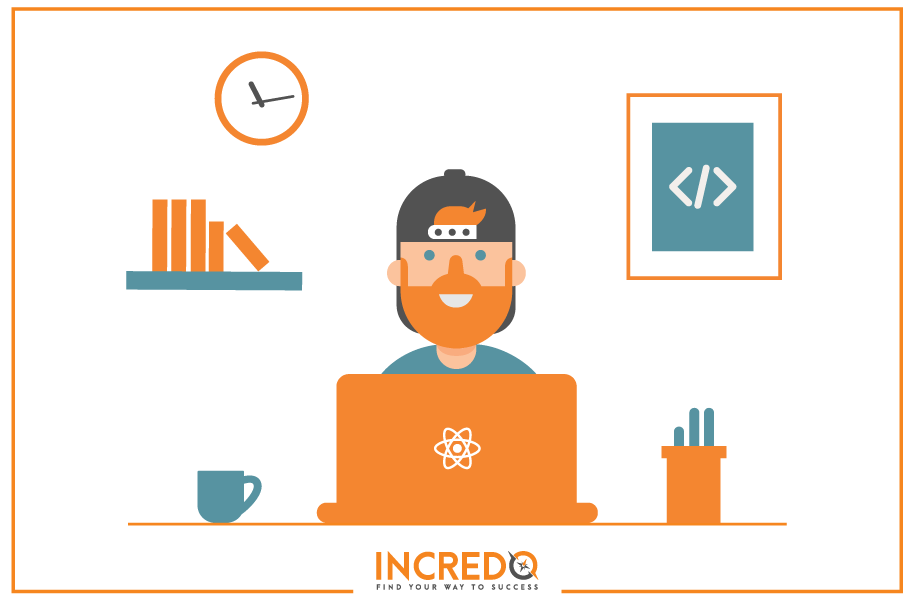Hire ReactJS Developers – Qualifications to Look For in 2021

Hire ReactJS Developers – Qualifications to Look For in 2021
Before hiring ReactJS developers, the two most important questions one should ask themselves are “what?” and “where?”. Specifically, it’s crucial to exactly define the expectations of skills and experience needed and then understand where to find it. Taking qualifications into consideration are valuable for any employer to ensure the company vision and interests align with the capabilities of the developer. The idea of a “great” developer varies from company to company based on needs, but there still are a few benchmarks they need to hit before being hired.
Risks of Hiring Unqualified Developers
Any SaaS founder should know that one or more unqualified developers are enough to let the whole project go down the drain. Hiring someone with less experience and skills than you initially expected is a risky choice which may or may not pay off for you. In this case, a lot of time would be wasted on hand-holding through projects to get the quality up to par with your standards. Those with less experience run the risk of also not being as cooperative if they don’t have previous working experience within a team. And finally, overall performance rates will be slower and possibly requiring more revision afterwards.
If you’re a non-technical founder or entrepreneur, finding middle ground with skilled developers is difficult enough. Depending on your level of expertise, you may have difficulty in communication and getting the full scope of the project from a technical perspective. Having unqualified developers on your team will jeopardize the project and you may not even notice it early on. Although it’s not impossible to be a successful non-tech SaaS founder, make sure you’re investing in the right skills. Having co-founders and managers with background knowledge in development can help you ensure that you’re on track with everything.
Qualifications to Look Out For
Level of experience is a helpful place to start when determining which developers will take on your projects. Junior, mid-level, and senior developers differ based on their practical experience, amount of salary that will be asked for the experience and also what roles they need to play in your team. Putting together an outsourced web development team either for a single project or in-house isn’t always as simple as hiring the “best” developers. It’s important to break down the individual advantages of each to get a complete picture of what to expect in the hiring process.
Junior ReactJS Developers
A junior level developer is one which has little to no professional working background or experience. Usually those who are just starting out in the industry are deemed as juniors, but it’s possible that by never really developing skills or striving for that, one can simply remain at a junior level. These developers are mostly just beginning to implement the basics in HTML, CSS, and JavaScript so mistakes are common and a lot of guidance is necessary.
The perks of hiring a junior developer is that you can train them up to your company’s standards for the next few years if you are forming an in-house team. They are more or less a clean slate to work with which means they will be flexible in learning your way of doing things instead of mixing previous experience with your expectations. With the amount of skills they acquire, junior developers make the least salary of all levels, which means this is financially beneficial for SaaS companies on a tight budget. Besides this, minor tasks and bug fixes are something they can take care of while higher levels are working on the relatively complicated aspects. Overall, junior developers while possibly not experienced, can be a good addition to any web development team.
Mid-Level ReactJS Developers
Mid-level developers, often called intermediate as well, are a step up in the ladder and are relatively independent. At this point, the developers have a clearer understanding of their work, both within the work sphere and related to the technical aspects of the project. They have less tendency to make amateur mistakes and have a better grasp of the software engineering tools which the project requires. Despite this, they are still supervised by seniors in the team to ensure everything is going according to the plan. Mid-levels are at a stage where you can easily assign and trust them with tasks.
Senior ReactJS Developers
At the top of the ladder are the seniors. Every project needs to have at least one senior developer to keep the project balanced and make sure it is headed in the right direction technically. Only having extensive skills in ReactJS isn’t enough to be considered a senior level developer. Solid understanding of various languages and technologies is valuable at this level since they are responsible for overseeing all aspects of the project, including software architecture, mentoring lower levels, future expansion of the project, and so on. A senior ReactJS developer in this case, is one who acquires all of these and on top of it is has planned and executed projects with the JavaScript library for most of their professional experience.
At this point, it’s apparent that the higher the level, the more professional experience is guaranteed along with a greater set of skills. In spite of this, it doesn’t mean that you need a team full of senior level developers. In fact, that’s actually what you need to avoid doing. Seniors are like the leaders of the team, if you have too many people taking charge, then it’s more likely that disagreements and coinciding ideas will break out among the team. Different levels carry out varying degrees of work so if there isn’t enough work for three senior developers, then it’s a waste of their time and yours to hire all three. Besides, the average salary of senior web developers is higher than others so it isn’t financially beneficial to over-hire more specialists than you really need.
Technical Knowledge
After breaking down which levels are necessary to carry out the specific project or position, it’s still valuable to understand what their individual skills entail within the level. Someone with relatively high professional experience may not have been ReactJS focused in their previous working environments. In order to be hired for a position that relies on ReactJS for work, there are minimum qualifications that must be met by the developer by testing their knowledge of basic concepts of ReactJS and actual practical experience with it. This includes differentiating when to use the library instead of other technologies for development, knowledge of life cycle events, how components function, syntax requirements, and so on.
Component Life Cycle
Component life cycles are a factor that every ReactJS developer should be familiar with to be able to plan the birth, updating, and destruction of UI components. A clear knowledge of the methods and phases of ReactJS life cycles will ensure better functioning user interfaces.
OOP (Object-Oriented Programming)
OOP (Object-Oriented Programming) knowledge is also essential for developers who work with ReactJS. Understanding of OOP principles is essential creating efficiently functioning and reusable components. It also eliminates the chances of conflicting codes or bugs affecting other components.
JSX and JavaScript
Familiarity with JSX (JavaScript XML) is another quality to look for since ReactJS primarily uses this syntax. It’s similarity to JavaScript and HTML is why many developers can easily pick up the syntax within their initial learning process of the library. Knowledge of ECMAScript is a final detail to look for before hiring the ReactJS developer for your project. Experience with the latest versions of this scripting language specification, primarily from ECMAScript 5 onwards, is commonly required for developers.
Knowing all the ways around the JavaScript library is a great plus for both developers. IT industry giants, such as Netflix, are relying on ReactJS as the foundation of their projects and looking for talents who can execute with this technology. With the increased demand of specialists in this particular area, competition is higher than ever for potential candidates to show as much technical knowledge with ReactJS and JavaScript elements as possible.
Tools and Methods to Check Qualification
After the team structure is decided, now it’s time to concentrate on specific technical requirements for each candidate. This can be done by not only checking their direct knowledge of ReactJS, but also what else they can bring to the table from previous experience. For example, basic understandings of competing languages such as Angular and Vue are a plus even though they may not work with these for the projects within your company. It’s great when a developer showcases diversity of software and techniques, but also be wary of those who endlessly list them without proper capability to execute.
React Native
If your SaaS company is thinking of developing mobile applications, then React Native knowledge is another qualification you want to look out for. React Native is used for developing native mobile applications, such as iOS and Android apps. While the language is very similar to ReactJS, it still requires some extra knowledge to be able to effectively use it.
If they match with the previous criteria and show sufficient knowledge all around in various other tools, it’s likely they’ll be more beneficial to your team.
While having all this is a plus, trusting people only by their word isn’t the most valid method when faced with the choice of hiring them or not. It’s necessary to check their qualifications with various methods to understand if they really match what’s written on paper. While asking technical interview questions and carrying out testing is effective, you can’t go wrong with checking code and viewing public portfolios. Platforms like StackOverFlow, Github, and CodePen are useful tools to check actual representations of their work. Here, developers can share their code, leave reviews and comments on others code snippets. These platforms help to get a preview of how neatly a candidate structures a code, and how efficiently it is written, meaning if the execution of code requires a heavy CPU usage or not.
Easy Ways to Spot Unqualified Developers
When paying attention to emerging red flags, it isn’t too hard to spot unqualified developers or those who don’t match with their self-proclaimed skills. Using online platforms, their portfolios, and samples provided upon applying are the best places to look for signs of an unqualified developer. The most effective proof of practical knowledge is examining their code structure. Examine the style in comparison with other codes, see if it is readable and if there are comments that explain the code. Make sure to also look for bugs and code errors. This initial examination will give a basic idea of the quality of the code the developer will deliver if hired. Having references and testimonials is also a plus since you have more insight about their previous work experiences.
How We Hire ReactJS Developers in Incredo
At Incredo, we use these practices in the process of hiring a web developer to join our constantly expanding team. Besides reviewing applicants, our HR specialist Ani and IT project manager Arman search through platforms such as Linkedin, StackOverflow, and Github for potential candidates. In StackOverflow, we look for candidates who are able to provide insightful answers about specific programming language concepts, specifically ReactJS. In GitHub, we search based on code samples. Candidates with well structured samples codes on Github are invited for an interview.
Once we have a shortlist for candidates, we begin a 3-stage recruitment process to determine which candidates are the best fit for the position and the team.
The Interview
The first stage is the interview portion, which in its turn consists of three parts. To start off, our IT project manager asks the developer about previous experiences with ReactJS development to understand the scope of projects the candidate has worked on before. It’s efficient to have a specialist in the tech industry carry out or at least assist in interviews in case the founder or HR specialists aren’t familiar with specific technical aspects of ReactJS. This eliminates the risk of not detecting red flags or underestimating worthy candidates.
After the brief overview, we ask questions about problem solving and, most importantly, we ask them if there were any issues they weren’t able to solve. This question is important for two reasons: first, it shows if the candidate is honest and has willingness to take responsibility for his or her failures. The latter two are an essential part of our corporate culture, because here at Incredo, we recognize our failures and take lessons from them. We believe that every company should ask questions that will help check the presence of the values that they have in their corporate culture. While technical knowledge is very important for a successful task completion, work ethic values can show how well the candidate will integrate with the team. Especially with software development, where the working style is agile, meaning that transformations happen often to fit the ever-changing needs, effective teamwork is essential.
The other reason this question is so important is that it helps us check if the candidate is talking about a real project or is just making it up. Our experience shows that candidates who make up situations for interviews, don’t think about mistakes or issues, they usually create perfect stories, so when you ask questions like this, their story line breaks.
Afterwards, it’s time to go in-depth with more technical questions to get an accurate understanding of their professional knowledge background. These questions are typically about JavaScript’s ECMAScript, OOP basics, and other ReactJS related questions which give insight into their capabilities regarding the library. In the end, we ask about their work space requirements. We believe that professionals deliver their best results when they feel comfortable, so we always try to understand how we can help our team players to feel comfortable.
Less Talk, More Show
Once we’re content with all the questions and their respective answers, we move on to a more practical stage of the hiring process. The candidate is given a test task to carry out which involves using the fundamentals of ReactJS. This is the best way to get an authentic perception of how the candidate carries out their work and if it aligns with the standards and interests of the company. While assigning test tasks is not specific to hiring developers, when hiring a new ReactJS developer, we have to make sure that everything they talked about or had in their portfolios wasn’t a lie. It’s better to take more precautions beforehand than to lose time and resources on the project later only to find out that the newly hired developer will need to be replaced.
Probation Period
If the candidate successfully proves his or her skills worthy in the previous stages , we proceed to the third and final stage. We set a period of time from an average of two weeks up to two months, depending on their performance. During this period, the chosen ReactJS developer will work within the company but being supervised by other senior developers. Their tasks and progress will be frequently checked. At the end of this period, it becomes apparent whether or not the chosen candidate has adapted to the working methods and has the potential of continuing their journey with us.
For successful hiring you need to take several details into consideration before hiring a new developer for your team. Once you understand what level of expertise you need to take on the next project and how much resources you are willing to spend, then you can move on to looking at the essential qualifications for a successful ReactJS candidate. It may be time-consuming to find those who meet your expectations, but looking through online platforms, conducting a testing, creating an interview process, and double-checking their technical knowledge are steps that will make it easier to find the diamond in the dust.
Tags:
SaaS Development
August 21, 2018



Comments